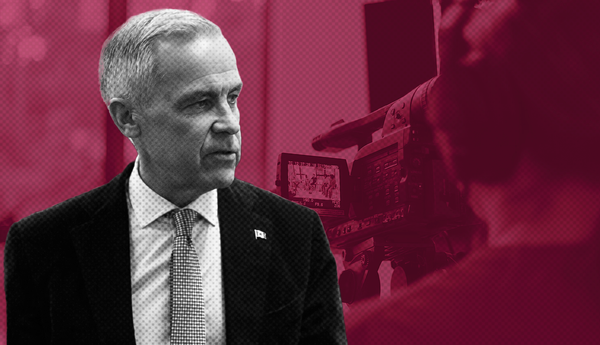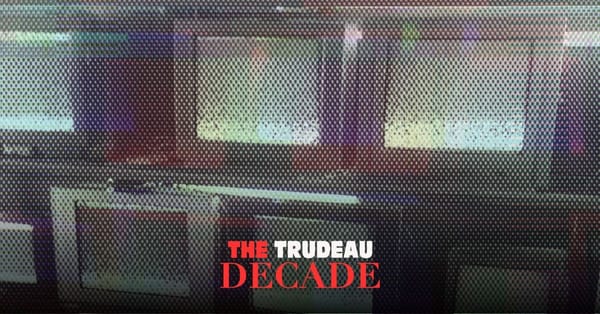In late 2019, I was facing severe underemployment, as well as a deep cynicism with the industry I was supposed to be a part of: journalism. By the end of the year, Passage’s co-founders approached me to be managing editor of the then-unnamed publication, with a contract starting in January. It seemed like a great opportunity to work on the sort of journalism I felt was absent from the media landscape. Maybe this was the path to beating back my cynicism, I thought; maybe this was a way to reclaim a faith in journalism.
Two years later, I can say that some of my hopes were met, and I’ve done the most useful work of my career at Passage. I’ve also realized my past estimation of the industry was wrong, though not in the way I expected: I should have been more cynical — things are worse than I thought.
My critiques of the industry in the first few years mostly focused on the right-wing papers and chains, as well as the conservative hacks and smug liberals scattered throughout corporate publications of all varieties. There was some hope, though, because it seemed like so many journalists around my age were on their way to breaking into corporate media, with better conceptions of what it should look like.
That certainly remains true today in some cases, but much of the cohort has been driven out of the industry or pushed into independent publications. Many of those that have stayed, meanwhile, have ended up being different from most of their predecessors in some ways, but deeply alike in more important ones. In October, Gawker published an insightful essay by Jenny G. Zhang, which I found helpful in illustrating these similarities and differences.
In terms of differences, Zhang writes that, “In the long arc of the mostly moral universe, we have arrived at this uncomfortable midpoint where liberation — from racism, from sexism, from other ingrained and systemic forms of linked oppression — is still a distant dream, but the language and gestures of social justice are more mainstream than ever.”
This is true of Canadian media, with things once largely limited to universities — a hot spot of the Equity, Diversity and Inclusion industry, as outlined and critiqued on the Anti-Girlboss Socialist Club podcast — now everywhere in journalism. It’s not just that these things are common, but that they’re also the defining feature of my generation of journalists.
In terms of the more important similarities, Zhang writes, “I now see that so much of how I and others talk about diversity, inclusion, and progress in this context is rooted in barely couched professional self-interest rather than a real commitment to upending the insular elitism that defines so much of how this industry works.”
The statements published, the talks and panels held, the reports put out, etc., all employ the language of social justice, but little has changed. And — what this article will focus on — the erstwhile ‘progressive journalist’ has become focused on joining the elites rather than working to undermine the system that let them thrive, but is convinced the former is equivalent to the latter.
I’m going to go over a couple different events from the past year that reinforced some of the suspicions I had about the ‘progressive journalist.’ My work is involved in both cases, which I realize may get this piece written off by some as a bitter rant, but these are intended to serve as examples of a broader trend.
In early January, I published a piece titled “Breaking Down Family Connections In Canadian Journalism,” which did exactly that, eventually including more than 55 families and 160 journalists.
Over the past few years, I’d witnessed, as mentioned earlier, what seemed to be a surge in interest in examining the makeup of newsrooms as a way to better understand the media. A lot of work had been done on looking at demographic factors such as race, gender, sexuality, etc. (Full disclosure: I was involved in some of these efforts.) I thought detailing how many journalists have or had family members in media, and outlining these connections would be a worthwhile addition. Almost no work had been done on this subject, so it seemed like an obvious choice.
As a whole, reaction to the article was positive. The general public seemed to intuitively understand why it was worth writing about, and it sits within our top five articles traffic wise for the year. Some older journalists thanked me for the list, while others provided many of the tips, including their own family members. Meanwhile, many journalists that were either pushed out of the industry or into independent publications appreciated the research, and said they found it helpful in understanding how they ended up where they were.
The ‘progressive journalists’ in mainstream media, however, had quite a different reaction: they were furious.
Despite the multiple disclaimers saying otherwise, they believed I was implying that either they, or their friends, were working journalists solely because of family members. This line of thinking — that pointing out systemic privileges means accusing beneficiaries of having no redeeming qualities of their own — was exactly what they had mocked the ‘old, white men’ upset about demographic surveys for in the recent past. And yet, they employed it here to purposely misrepresent the article assuming most wouldn’t read it, and portray themselves or their friends as victims, with little regard for the lack of consistency.
As former journalist Tannara Yelland noted on Twitter, the list served as a “reflection of the fact that the people who disseminate information to the Canadian public are overwhelmingly drawn from a small pool. Yes, many of those people are talented. But that doesn’t negate the first fact.”
They were also outraged at being on the same list as Jonathan and Barbara Kay. The Kays have been mocked by ‘progressive journalists’ for years, frequently getting accused of being blatant examples of nepotism because they’re in the same industry and worked at the same publication. And yet my article, which pointed out similar relations between other journalists, without any accusations of nepotism, was somehow unacceptable.
While I find more value in what most of these journalists do than the Kays, they also, frankly, have deeper family ties in the industry than the mother-son duo. Some of the families in my article had more than four generations at one newspaper. Many had at least two, sometimes three, generations working at the same newspaper or radio/TV station at the same time. There were even sometimes articles written about these relations, celebrating them with noxious claims that journalism was ‘in their blood.’ And yet, they felt like they didn’t belong on the same list as the Kays. Apparently systemic privilege only benefits those you don’t like, not you or your friends.
Even their critiques of the article that weren’t just explicitly motivated by protecting their friends from perceived slights reinforced regressive ideas that they’d condemned in the past. For example, many people argued I should have reached out to all of the journalists on the list that were still alive for comment. They never specified what I should ask them, or why I’d need their comment to compile public information that they had gleefully shared with the world over the years. But they did say that in order to know if nepotism, or at least privilege by way of having a relative in the industry, existed in journalism, I needed their input.
This is effectively saying that in order to truly understand how racism works in the industry, we need to hear from white people; that in order to really grasp what impact sexism has, we need to listen to men; that we need the rich to confirm they have an easier time than the working class. This is especially true considering the list of journalists in my article was made up roughly as follows: 1 per cent racialized men, 2 per cent racialized and Indigenous women, 34 per cent white women, 63 per cent white men. This is a blatantly elitist and patronizing line of thinking that would be, and had been, condemned in other cases.
The idea that you’d benefit from being white in the industry, but that being white with family members who are also white working at the same place as you wouldn’t be an advantage, or worth examination, was bizarre. Writer Andray Domise pointed this out in a since-deleted tweet, noting, “The idea that it’s not in the public interest to know about family connections in an industry that is overwhelmingly white and upper/upper middle class is laughable and I can’t believe people with CVs as long as yours can’t pull your heads far enough out of your asses to see it.”
Overall, the response from the ‘progressive journalist’ to my article indicated that they either didn’t really understand systemic privilege or just pointed it out using buzz words when useful for brand building, but ignored it when doing otherwise would be personally inconvenient. Because, of course, the narrative of the ‘progressive journalist’ breaking into the industry to replace old white men doesn’t sound as inspirational when you realize the old white men are their fathers and grandfathers, and they’re just keeping the family tradition going.
Again, the rhetoric has changed from the past, but the commitment to upholding journalism’s culture of insular elitism has remained.
The next flare up came in October, when some journalists faced a targeted campaign of harassing emails. In response, a collection of newsrooms and organizations released a statement claiming that they were “united in supporting our journalists and newsrooms” and would “continue to advocate for industry-wide responses to end this behaviour.” Later that day, the Canadian Association of Journalists (CAJ) put out a blog noting that they were “working to establish communication with the Royal Canadian Mounted Police (RCMP) and other law enforcement agencies to understand how they plan to address the dissemination of threatening messages.”
A couple days later, I published an article that focused in part on critiquing the CAJ for relying on the cops because, “The police are not on the side of journalists. They are not on the side of the demographic groups being targeted in these hate emails. They are not on the side of press freedom. They are not on the side of workplace equity, and certainly not on the side of liberty.”
After the past year or so of witnessing the ‘progressive journalist’ appearing to get increasingly onboard with the defund/abolish the police movement, I expected they’d at least be open to my critique of the CAJ. I was wrong.
My article explicitly noted it was a critique of the CAJ relying on cops to try to solve our problems, not what any individual journalist chooses to do for themselves. And yet, I was accused of doing everything from shaming racialized women up to and including wanting them to die or actively putting them in danger by virtue of publishing the article.
Never mind that journalists had spent the last few months outlining how police forces are filled with white supremacists. Never mind that we had been encouraged to support CAJ lawsuits against police forces physically preventing journalists from doing their jobs. Never mind that police were often critiqued for being racist, sexist and abusive, but were now being called in to help fight racism, sexism, and abuse. Never mind that police have rightly been regarded as harmful to marginalized groups, and the journalists in question facing the abuse were largely from said demographics. None of this seemed to matter, and I was accused of being a reactionary, often by white men, for critiquing a roughly 70 per cent white organization, with a white president, for relying on cops.
Critiques of this article often employed deeply reactionary narratives (as was the case with my family journalism piece.) Despite all evidence to the contrary, police were portrayed as being eager and capable defenders of racialized women. They were depicted as being the only option available to those in trouble. They were described as being necessary, with those making the argument also claiming this would be the case for a while to come.
Sure, some of the people critiquing me said cops weren’t perfect, or even good, but this matters little. Police propaganda doesn’t need to convince everyone they’re heroes. It just needs to convince people they’re the only option out there, and society wouldn’t function without them. Many of the critiques of my article served this purpose, because if receiving harassing emails is more than a good enough reason to justify keeping cops around, what wouldn’t be? Unless, of course, the interests of journalists were regarded as mattering more than others.
Like the family journalism article, this was an example of the sort of systemic critique that the ‘progressive journalist’ usually employed to distinguish themselves from many of their predecessors being ignored for personal convenience. But this took it a step further, where the language of social justice and identity was not just ignored, but actually used to defend a deeply reactionary position, and justify it as something progressive.
And this points to the broader problem with the failings of the ‘progressive journalist.’ It’s not just that they’ve proven to be milquetoast liberals instead of the progressives or even radicals they imagine themselves as. It’s that they’ve been able to position themselves as the gatekeepers of what ‘progressive’ politics in journalism can be, turning their easily co-optable stances into careers, and reinforcing the barriers that keep those further left out of the industry. Critique cops to a lesser degree than them and you’re a racist. Go a bit further than them and you’re performative or unserious. They have the exact right position, and will enforce it as such.
This was on display during the backlash to the cop article, where the journalists complaining completely ignored the racialized people who agreed that going to the cops was somewhere on the spectrum of lazy to actively dangerous.
For example, Gawker writer Sarah Hagi noted her agreement with the article, and said, “I understand the feeling of using the only tools at your disposal but if someone is brutalizing me online, sending me threats, harassing me I need to know what the same organization that brutalizes people like me would do to protect me?”
Later that month, Hill Times columnist Erica Ifill, responding to news of the RCMP’s activities at the Fairy Creek blockade, noted, “This must be the same RCMP the @caj encouraged its members of colour and female-identifying members to run to when there is trouble. What if the RCMP is the trouble @caj?” She added, “I feel like @caj needs to answer for why it encouraged reporting online hate to the RCMP. Like they need to walk us through their thought process because I have SERIOUS questions.”
Neither Ifill or Hagi had their questions or concerns responded to, at least publicly.
The ‘progressive journalists’ who felt targeted by my article focused their energy on attacking me, but because they didn’t want to actually deal with my critique, they ended up erasing all of the racialized people that had been making the argument for much longer — the people I learned from.
But this pattern plays out on a wide range of other issues as well: the ‘progressive journalist’ finds the optimal time to intervene on a social matter (when it’s relatively safe for their careers, but just edgy enough to help build their brand) with a liberal repackaging of what activists have been pushing for years, and then rigorously enforce this bastardized version as the only acceptable opinion, all while being hailed by media peers as brave truth tellers. This impacts how stories are covered, limits what voices are given platforms and warps the public’s understanding of history and the issue at hand.
Meanwhile, the pattern of intra-industry behaviour that has plagued the field for decades (or so I’ve heard) also seems to have changed little. Sure, the ‘progressive journalist’ will sometimes vigorously critique right-wing outlets viewed as acceptable targets in a way that many of their predecessors wouldn’t, and this is genuinely valuable. At the same time, little public critique from the left of anyone involved in this new liberal bubble is received in good faith or with consideration. It’s why the sort of criticisms that should be published instead are often limited to group DMs. What’s worse is that making it in the industry relies so heavily on networking, which helps build these connections that ensure no criticism will be made publicly, or else.
Tellingly, though, this moratorium on public critique doesn’t extend to outlets on the left. Perhaps it’s because leftist outlets go beyond the limits the ‘progressive journalist’ sets up, and therefore are ‘unserious,’ deserving scorn. Or maybe it’s because by virtue of not being part of massive corporations these outlets don’t have much to offer career boosting wise, so they are viewed as safe targets.
The ‘progressive journalist’ has been a bust, being safely absorbed into the industry with only shallow, surface level changes to show for it. Of course, it’s not all their fault. The industry is likely beyond meaningful reform. But we have a responsibility, then, to create alternatives.
And so, despite all my cynicism, I’ve been pleased to see independent, leftist publications growing. While they’ll never replace the mainstream, they are making the media landscape better. This is where the future of subversive journalism largely is, and if hope in media remains, it is with these places and the people that work at them.







